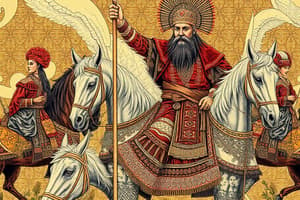Podcast
Questions and Answers
What is a nomadic empire?
What is a nomadic empire?
An imperial formation constructed by nomadic groups.
Who established the Mongol Empire?
Who established the Mongol Empire?
Genghis Khan
What were the primary sources of knowledge about nomadic societies?
What were the primary sources of knowledge about nomadic societies?
- Oral traditions
- Travelogues (correct)
- Chronicles by city-based litterateurs (correct)
- Literature produced by nomadic groups
The Mongols were primarily agricultural people.
The Mongols were primarily agricultural people.
What was Genghis Khan's original name?
What was Genghis Khan's original name?
Genghis Khan was born in __________.
Genghis Khan was born in __________.
Which dynasty ruled northern China during Genghis Khan's conquests?
Which dynasty ruled northern China during Genghis Khan's conquests?
What was the consequence for towns that resisted Mongol forces?
What was the consequence for towns that resisted Mongol forces?
Genghis Khan returned to Mongolia after conquering India.
Genghis Khan returned to Mongolia after conquering India.
Which of the following cities surrendered to the Mongol forces?
Which of the following cities surrendered to the Mongol forces?
Flashcards are hidden until you start studying
Study Notes
Nomadic Empires
- Nomadic empires were formed by nomadic groups which moved from place to place.
- Genghis Khan was the leader who established a transcontinental empire spanning Europe and Asia between the 13th and 14th centuries
Sources, Mongols and Their Lifestyle
- The Mongols themselves didn't document their history, but sources come from travelers, including:
- Buddhist, Confucian, Christian, Turkish and Muslim
- The Mongol successes attracted many travelers who wrote various accounts of the Mongols, some sympathetic and others hostile.
- Nomadic Mongols were a diverse group of people who spoke similar languages.
- Mongols lived a nomadic life in Central Asia.
- Mongols lived in tents, moving herds seasonally.The Mongols were pastoralists, they herded animals like horses, sheep, cattle, goats and camels.
- Their nomadic lifestyle prioritized animal husbandry over farming practices.
- Mongol society was patriarchal
Genghis Khan
- Born in 1162 near the Onon River in present-day Mongolia.
- His original name was Temujin.
- His father, Yesugei, was a chieftain of the Kiyat clan.
- His father was murdered at a young age and he was raised by his mother, Oelun-eke was Genghis Khan's mother, who raised him after his father's murder.-eke.
- He experienced extreme hardship during his childhood, including being captured and enslaved.
- His wife, Borte, was kidnapped and he had to fight to recover her.
Genghis Khan: Building Relationships and Acquiring Power
- While enduring hardships he made important friends, like Boghurchu and Jamuqa.
- Temujin rose as a dominant figure in the politics of the Mongol steppes, a position recognized at an assembly of chiefs.
- He was proclaimed "Great Khan of the Mongols" and given the title Genghis Khan, which means "Oceanic Khan" or "Universal Ruler."
Mongol Conquests
- Genghis Khan's first conquest was China, which was divided at the time into three realms:
- The Hsi Hsia dynasty in the northwest.
- The Chin dynasty ruled north China.
- The Sung dynasty ruled south China.
- In 1209 the Hsi Hsia were defeated and the Great Wall of China was breached in 1213.
- Battles against the Chin continued until 1234.
Conflict with Khwarazm
- Sultan Muhammad of Khwarazm executed Mongol envoys, which worried them about an invasion.
- Campaigns between 1219 and 1221 led to Mongol victories and the fall of these cities:
- Otrar, Bukhara, Samarqand, Balkh, Gurganj, Merv, Nishapur, Herat
- Cities that resisted were devastated by the Mongols.
- Mongol forces pursued Sultan Muhammad into Azerbaijan and defeated Russian forces.
- Another Mongol force pursued Sultan Muhammad's son, Jalaluddin into Afghanistan and The Sindh province.
Genghis Khan's Return to Mongolia
- At the banks of the Indus, Genghis Khan considered returning to Mongolia through North India and Assam but changed his mind due to:
- Heat
- Natural habitat
- Ill portents from his Shaman soothsayer
- He died in 1227.
Studying That Suits You
Use AI to generate personalized quizzes and flashcards to suit your learning preferences.




